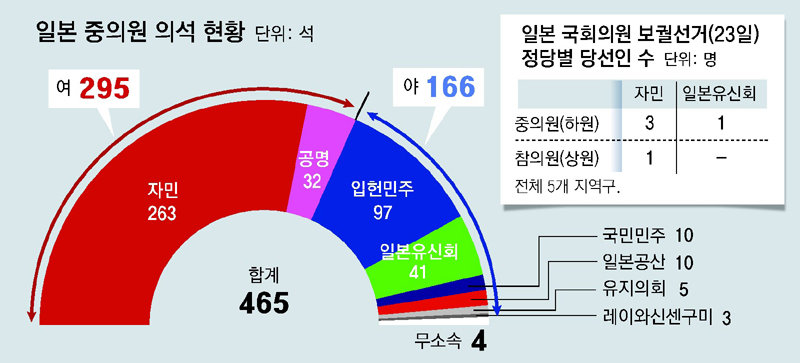Liberal Democratic Party wins 4 out of 5 by-elections
Kishida’s ‘early general election card’ fiddling
Asahi Shimbun “Excluding the Abe constituency, close combat
The Liberal Democratic Party’s evaluation of “a victory that cannot be rejoiced”
In the by-elections for members of the Japanese Diet held in five constituencies on the 23rd, the ruling Liberal Democratic Party won four seats and increased its seats. There is also a prospect that Japanese Prime Minister Fumio Kishida, whose approval rating has been on the rise since the bomb-throwing terror, will continue to take the initiative in running state affairs, which could lead to a sudden dissolution of the House of Representatives (lower house). In Japan, which has a cabinet responsibility system, the prime minister and the ruling party often strengthen their leadership in state affairs by dissolving the National Assembly and holding general elections at the most favorable time for them.
However, there is also an analysis that Prime Minister Kishida will be more careful in managing the political situation in the future. This is because the far-right Japan Restoration Society won a victory as the second opposition party in the parliament in the area where the explosives were thrown after starting a support campaign, and LDP candidates in the metropolitan area won but fought fiercely.

In the constituency (Yamaguchi 4th Ward) of former Prime Minister Shinzo Abe, who was killed in a shooting last year, Shinji Yoshida, a former member of the Shimonoseki City Council in Yamaguchi Prefecture, was elected. It was supported by former Prime Minister Abe’s wife Akie.
Former Defense Minister Nobuo Kishi, younger brother of former Prime Minister Abe, resigned due to health problems, and in Yamaguchi District 2, which was vacant, Kishi’s son Nobuchiyo Kishi defeated an independent candidate who was a former minister of the Democratic Party.
In Chiba District 5, which was the only one in the metropolitan area among the five districts in the by-election, Liberal Democratic Party member Eri Alfia, a second-generation Uyghur immigrant, was elected. In Oita Prefecture (House of Councilors), Liberal Democratic Party Aki Shirasaka (白坂亞紀), a former owner of an upscale bar in Ginza, Tokyo, was elected.
In Japan, where there are no large-scale elections this year, this election has the character of an interim evaluation of the Kishida administration. Prime Minister Kishida met with reporters that day and said, “I take the increase in the number of seats in the ruling party as an encouragement to do well on major policy tasks of the LDP.” Toshimitsu Motegi, secretary-general of the Liberal Democratic Party, commented, “If you think of the midterm evaluation of the Kishida administration, it has received a positive evaluation.”
However, excluding Yamaguchi, who had a great influence on former Prime Minister Abe, in the metropolitan area (Chiba 5 Ward), there was only a 3 percentage point difference from the opposition candidate, and in Oita Prefecture, where the opposition was strong, about 390,000 voters voted, and only the second-place candidate. It was a super fierce battle by 0.09 percentage points (341 votes). This is why there is an analysis that the bottom line is not serious. The Asahi Shimbun evaluated, “It was a close-knit victory that the Liberal Democratic Party cannot easily rejoice in as it waged a close battle in the rest of the region except for former Prime Minister Abe’s constituency.”
The propaganda of the Japan Restoration Association, which won the governors of Osaka prefecture and Nara prefecture in the regional elections on the 9th, continued. In the next general election, the possibility of competing with the progressive Constitutional Democratic Party for the first opposition party is even being discussed.
Yumi Hayashi, a member of the Japan Restoration Association, became the only opposition member of the National Assembly in the by-election as Prime Minister Kishida defeated a LDP candidate in Wakayama’s 1st district, which was hit by a terrorist attack. Even though Prime Minister Kishida personally campaigned until the day before the election, LDP bigwigs fired in support one after another, but they were unable to break the wind of the Restoration Society.
Interest in Japanese politics is focused on the dissolution of the House of Representatives.
Prime Minister Kishida said on the 24th, “I’m not thinking about dissolving the House of Representatives or general elections right now.” Kyodo News pointed out, “Inside the LDP, ‘4 wins, 1 loss’ is seen as a victory, and the dissolution of the House of Representatives may expand.” In Japan, there are observations that the group will disband early right after the G7 summit in Hiroshima on May 19-21 in line with the rise in Prime Minister Kishida’s approval rating.
However, within the Liberal Democratic Party, opinions are emerging that “the results were good, but the contents were bad” and “it is difficult to disband in such a close battle” and that we should be careful about disbanding early. In Japan, the dissolution of the National Assembly is the prerogative of the Prime Minister.
Tokyo =
Source: Donga
Mark Jones is a world traveler and journalist for News Rebeat. With a curious mind and a love of adventure, Mark brings a unique perspective to the latest global events and provides in-depth and thought-provoking coverage of the world at large.